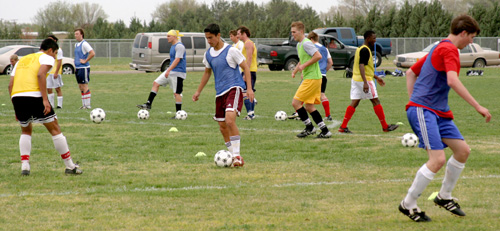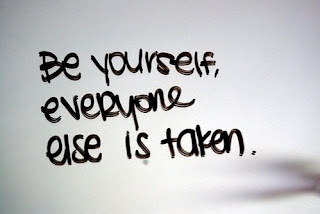Chances are, if you're reading this, you coach an amateur team that belongs to a club or educational institution.
Nobody has the tryout process mastered and we've all made mistakes that we wish we could take back. We try to conduct them as professionally as possible, but nobody has it mastered.
What is your job during tryouts? What is appropriate for the age you are coaching? (If you are coaching U12 and below, are tryouts appropriate at all?)
You're thinking this might be a guide on how to select players, but it's just as much about the players you don't select and the environment you've set up at tryouts.
I am fortunate that I have a very enjoyable coaching situation with the Niagara College Men's and Women's Soccer programs. I am surrounded and supported by good people and I like to think we look at the tryout process in a bigger scope, outside of soccer.
On a quantitative level, our job is to select the 22-24 student-athletes who we feel will achieve the best possible results and challenge for a national championship. There is much more going on.
Nobody has the tryout process mastered and we've all made mistakes that we wish we could take back.We are in a different position than basketball and volleyball. Their student-athletes have a chance to acclimatize to the campus environment and fall into a bit of a routine before their athletic schedules ramp up to their full commitment. The first-year players who are in our program are figuring out their academic life while the soccer program is in in full motion, with some living away from home at the first time.
What do you need to keep in mind during your tryouts in your particular coaching situation?
This is what we need to consider during tryouts for our college program:
- Recruiting begins early, many times when the prospective player is in Grade 11. Are we giving them a positive image of Niagara College, and post secondary education in general? We have the ability to get them excited about the next phase of their education. (Is your club's travel program making a positive impression that seeps its way down to the younger age groups?)
- Varsity Soccer tryouts begin August 14, a full 26 days before the fall semester starts. Do our new students and prospective athletes receive a positive impression of the college they've chosen? If their parents drop them off, what will be their impression?
- Is the organization and delivery on Day 1 consistent with the experience that Niagara College wants their new students to encounter?
- Is the selection process laid out for them? Is the Day 1 experience at soccer a sneak peak at their first days of class when professors review their Course Outline and Teaching and Learning Plans for their selected courses in their respective programs?
- Do they know what's expected of them, physically? Are they aware of the commitment and expectations?
- Niagara College is a diverse learning community and our tryouts reflect that in every way. We welcome the athletes, share our passion for the game and our enjoyment of the situation, but we don't use jargon, clichés or make parochial comments to ensure the environment is inclusive and welcoming. Not only is it respectful and properly reflects Canada, it also helps more players bring out their best and puts us in a better position to select the strongest team.
- Can we answer more immediate questions for them about the college and details they need to tend to before classes begin? During tryouts we receive questions regarding registration, financial aid, bookstore hours, local amenities, etc.
- Is the process fair and does it provide players with a true opportunity to showcase their skills? Not only does this respect the player, again, it gives us a better chance of selecting the best players.
- How do we deal with the players who aren't selected along the way? Some players have moved into their new living arrangements early and may end up being in Welland for a few weeks before classes begin. Many go home and return for classes, but a few remain in the city.
- Did we create a positive enough experience that the players who weren't selected still wish to seek out an active lifestyle in their new college environment? Being released from tryouts is a difficult life event, but handled correctly the player will find other avenues to stay active.
- For the players who are selected, have we provided enough guidance and support that the beginning of the semester is a positive experience, not an avalanche of new commitments.
That is our spectrum of considerations every August. What does your club expect of you? Do the players you released continue playing or do they quit after the selection process? Will they stay at your club and try out again next year?
How you conduct the process and treat the players you release speaks volumes of who you are and
 |
| An example of a tryout ad. I have no idea who this club is. |
Some ideas for your tryouts:
- Do the players understand what you're looking for? If you can't spell it out and share it, how will you know if you see it. Sometimes a coach will tell a player "You didn't have what we were looking for." and the player is wondering "What were you looking for?"
- Learn their names. We have a lot of players attending and take everybody's picture with them holding their name on a small whiteboard, resembling a mug shot. I had a released player tell me once that I didn't know who he was. When my assistant and I told him what he was wearing the past few days, where he was playing and some of the on-field scenarios we remember, he dropped the accusation.
- Be ready and organized! Get the tryout sessions going quickly so the players can show their stuff. Long speeches at tryouts are just long speeches, nothing else. They came to impress you, not vice verse.
- Give players a fair chance to showcase their skills. Often, if they're realistic, they will know the outcome before you tell them. In a situation where there are a lot of players, not everybody will have a chance to play in a game, but there are still ways to have a game situation. A good friend is a scout for the Boston Bruins and he said once that players will cut themselves if tryouts give them enough chances to play. I never forgot that.
- My pet peeve is signing players along the way until you have two or three players battling for one or two spots - you've pretty much just told those kids they are the weakest on your team and you've set up a pecking order from day one. If you do implement that method, do so at your own risk and don't email me for advice because you will not like my answer.
- If you are releasing a player, give them some information so they can move forward. In a youth club environment, a list of contacts for other playing situations would be very helpful to them and their parents.
My final point for you to consider is how quickly news spreads in 2016. Whether you inform the selected or released players first will not affect how quickly the telephone and social media inferno ignites and players start to figure out the team on their own. The news should come from you, not from somebody else's Facebook status.
The specific process you implement will depend on numbers, schedule, facility availability etc.
The specific process you implement will depend on numbers, schedule, facility availability etc.
Remember what your tryouts are; a group of ambitious, enthusiastic athletes who want to show you that they have the skills to be selected to the program you are running. Their willingness to be judged and evaluated obliges you to give them the respect they deserve and nothing less.
Just remember to run a tryout process that you would feel comfortable with if you or your child were trying out for a team.








